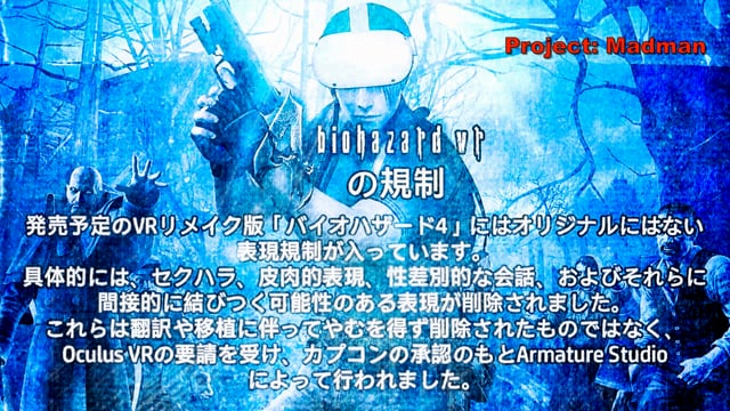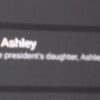
Insider sources have revealed that Facebook have requested the censorship of Resident Evil 4 VR to avoid social justice warriors and game journalists calling it misogynistic.
Peter Pischke of The Happy Warrior reports that his sources were included “individuals with different backgrounds and positions at different companies, some with ties to the game development community, that are only united in their appreciation for the original title.”
According to sources sharing in-development footage, documentation, and photos; the game has censored story content and dialogue, removing scenes, and achievements. The alterations to scenes and dialogue were focused on anything “that the gaming news media and social justice crowd may deem misogynistic.”
This is not just Pischke’s speculation either. The Japanese text in the video, seemingly added by the leakers, states that there are “regulations on expressions” not in the original game. This is not due to translation or limitations of porting the game into VR.
“Specifically, sexual harassment, sarcastic expressions, sexist conversations, and expressions that may be indirectly linked to them have been removed.” Rather than localizers blame, it seems Oculus VR owner Facebook requested the changes, and with the approval of Capcom. This was seemingly against promises Facebook had made earlier, to the surprise of the sources.
The infamous Capcom Ragnar Locker Ransomware hack and subsequent leaks [1, 2] of 2020 revealed information of upcoming games (some of which seems to have come true), along with politically correct business strategies. To avoid drama and controversy, the documentation discussed avoiding discriminatory or prejudice language.
Other points of note included gender neutral cosmetic options, only featuring certain ethnicities or portraying them as unequal or stereotypical, and avoiding sexual or obscene language and jokes unless inevitable based on the context of a story or narrative. The Last of Us Part II and Shadow of the Tomb Raider were given as positive examples of LGBTQ characters; while Peach and Zelda were “damsels in distress.”
Sex appeal, such as bikini costumes or lewd poses and costumes, should be equal between men and women, and serve a purpose in the context of the story. However, costumes cannot appeal to only one kind of user base, such as only one gender.
As for Resident Evil 4 VR itself; the changes include the removal of flirting from multiple characters. These include Leon and Ingrid, Luis Sera and Ashley, and Ashley and Leon at the end of the game. Specifically, Luis comment about Ashley’s “ballistics” being removed also means the achievement named “Secure the Ballistics” has been renamed “Secure Ashley.”
Flirtations scenes also feature large swathes of dialogue completely cut; with the ending losing 30% of the dialogue. While included in the video, the post-credit scene where Leon is rebuffed by Ingrid for asking for her phone number is entirely removed from the VR game. This is in-spite of a “misogynistic” Leon being shot down in a comical manner by a female character.
Another example includes a bloodied corpse of a woman with an axe in her head-pinning her to the wall. In the original, Leon states “Guess there’s no sex discrimination here” when examining the body. In the VR version, he only states “Guess no one’s safe here.
The edits also feature scenes of dead-air between characters where they would have otherwise been talking, and missing assets. There are also two “major revisions” to the VR version, but were unpublished and undetailed by Pischke to protect his sources’ identities.
This is all in spite of prior press releases stating “all cutscenes will be present in their original format” and Oculus Executive Producer Ruth Bram stating that there would be few changes, and those made would be done “reverently.” Pischke notes that footage in a hands-on preview by IGN cuts away before any altered dialogue would play, suggesting an embargo.
You can find the examples of those changes below.
While Resident Evil series producer Masachika Kawata is involved with development (along with Armature Studios), Capcom is reportedly only supervising the project. The sources theorize that, despite how protective Capcom usually is of its IP, the censorship could have been “simply have been the price of doing business together.”
In theory, the project may have gotten under way and some considerable investment, before Facebook changed their mind (genuinely or as an excuse for what their motives always were). They then request the game’s content be edited or receive a much higher age-rating, or even refusal to sell the game. Once again, this is only a hypothesis.
What is strange is that Facebook users are now obligated to link their Facebook and Oculus accounts. This way, Facebook could see if a user is playing a game too young for them and restrict sale or play. Those who lied about their age would risk their account being terminated, and losing access to their games [1, 2, 3].
Impressionable eyes may have once been the primary argument of moral guardians, but the reason for this censorship is not for fear of it being seen by children. As aforementioned, the censorship was to quell outrage from social justice warriors and gaming journalists; in spite of the former not being the game’s primary audience (the fans of the original), and the latter reporting the outrage due to the former.
We have reached out to Capcom for comment.
Resident Evil 4 VR launches October 21st for Windows PC via the Oculus Quest 2. Resident Evil 4 is also available on many platforms; including Windows PC (via Steam), Nintendo Switch, PlayStation 4, Xbox One, and Android in Japan. In case you missed it, you can find our review for Resident Evil 4 HD here (we recommend it!)

